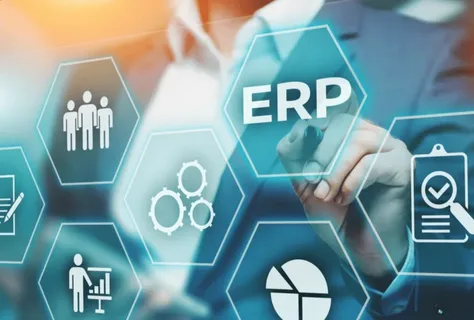What Is Enterprise Resource Planning Systems: A Complete Overview
In this digital age, businesses must keep pace with the latest technological advancements to stay ahead of the competition. Modern entrepreneurs must handle a plethora of business functions, such as financial management, employee management, customer relationship management, supply chain management, and much more. It is here that Enterprise Resource Planning (ERP) Software comes into play. This complete software suite offers a comprehensive solution for businesses to streamline their operations, eliminate redundant tasks, increase productivity, and cut costs. In this blog, we will provide an in-depth look at what is enterprise resource planning systems and how it can help businesses of all sizes achieve their goals and navigate the challenges of the ever-evolving business world.
What is Enterprise Resource Planning (ERP) Software & How Does It Help Businesses Streamline Processes
Enterprise Resource Planning (ERP) software is a centralized system that helps businesses streamline their processes by integrating various functions such as accounting, human resources, supply chain management, inventory control, and customer relationship management. With an integrated ERP system, businesses can achieve increased efficiency, better decision-making, and reduced operational costs. The software provides real-time data and insights that can be used to make informed decisions and optimize business processes.
ERP software enables businesses to standardize and automate their processes, saving businesses time and resources that in turn can be utilized in other core areas of the business. ERP software automates manual processes such as data entry, data analysis, reporting, and decision making, allowing businesses to focus on their core operational activities. This leads to improved accuracy, productivity, and efficiency in business operations. With accurate data in hand, businesses can make informed decisions that ultimately help them to achieve their overall goals.
In addition to process automation, ERP software also helps businesses to establish better communication between departments, leading to better collaboration, enhanced productivity, and empowered employees. With an effective ERP system in place, businesses can analyze their operations and optimize them to provide better customer experiences, resulting in increased profits and a competitive advantage.

Benefits of Implementing an ERP System in Your Business
In today’s fast-paced business world, it’s essential to stay ahead of the competition, streamline processes, and improve productivity. That’s where ERP systems come into play. By implementing an ERP system in your business, you can enjoy a range of benefits that will boost your bottom line and make your organization more efficient.
Firstly, an ERP system centralizes all your business processes, from finance to supply chain management, in a single platform. This means that you’ll have better visibility of your organization, and you’ll be able to make informed and timely decisions based on real-time data. With an integrated system, you’ll eliminate the inefficiencies and errors that result from juggling multiple programs and databases, which will save your employees’ time while boosting your overall productivity.
Secondly, an ERP system can help reduce your operational costs. By automating routine tasks, reducing manual data entry, and providing more accurate and timely information, you’ll be able to reduce waste and optimize your resources. This, in turn, can help lower labor costs, reduce inventory, and cut down on production times. Over time, these cost savings can add up, giving you a competitive edge and allowing you to invest in your business’s growth and development.
Finally, an ERP system can improve customer satisfaction and retention. By centralizing customer data and providing a 360-degree view of customer interactions, you’ll be able to deliver more personalized and timely service. You’ll also be better equipped to handle customer complaints and inquiries quickly and efficiently.
Steps to Select an ERP System for Your Business
Selecting an ERP system that best fits your business’s needs and goals is crucial for its successful implementation and integration. Here are some steps that can help you choose the right ERP system for your business:
- Define Your Business Needs: The first step in selecting an ERP system is to understand your business’s specific requirements. Identify areas where inefficiencies exist, and determine the features and functionalities you need in an ERP system to address those challenges.
- Research: Conduct thorough research on various ERP systems available in the market. Consider factors such as cost, features, support, scalability, and integration capabilities when comparing different options.
- Assess Customization Options: Every business has its unique needs, and a one-size-fits-all approach may not work for all organizations. Look for an ERP system that offers customization options to tailor the software to your specific business needs.
- Evaluate User-Friendliness: A user-friendly interface is crucial for effective utilization of the ERP system by your employees. Consider a system with a simple and intuitive interface, as it can save time and reduce training costs in the long run.
- Consider Future Growth: Your business is likely to expand and evolve over time, so it’s important to choose an ERP system that can accommodate your future growth. Look for a system with scalability and flexibility to adapt to your changing business needs.
- Check Integration Capabilities: An ERP system should be able to seamlessly integrate with other software and applications used in your organization. Make sure to evaluate a system’s integration capabilities before making your final decision.
- Look for Adequate Support: An ERP system is a significant investment for any business, so it’s important to choose a vendor that offers reliable and timely support in case of any issues or questions.
With the right ERP system in place, you can streamline processes, increase productivity, and make informed decisions to drive growth and profitability.

Features Your Business Should Look for in an ERP System
When selecting an ERP system for your business, there are certain features and functionalities that you should consider to ensure it meets your specific needs and goals. Here are some essential features that every business should look for in an ERP system:
- Comprehensive Financial Management: An effective ERP system should offer robust financial management capabilities, including accounting, budgeting, cash flow management, and financial reporting. This will give you better visibility and control over your organization’s finances.
- Supply Chain Management: A good ERP system should also include features for managing your supply chain, such as inventory management, purchasing, and supplier relationship management. This will help optimize your supply chain processes and improve efficiency.
- Human Resource Management: Look for an ERP system that includes HR management features, such as employee data management, payroll processing, and performance tracking. This will help streamline your HR processes and improve employee engagement.
- Customization Options: As mentioned earlier, every business has its unique needs, so it’s important to choose an ERP system that offers customization options to tailor the software to your specific requirements.
- Mobile Access: In today’s mobile-driven world, having access to your ERP system on-the-go is essential. Look for a system that offers mobile accessibility, so you can stay connected and manage your business from anywhere.
- Business Intelligence and Analytics: An ERP system with built-in business intelligence and analytics capabilities can provide valuable insights into your organization’s performance. This will help you make data-driven decisions and identify areas for improvement.
- Multilingual and Multi-currency Support: If your business operates globally, it’s important to choose an ERP system that supports multiple languages and currencies to effectively manage transactions and communication with international partners.
By considering these features when selecting an ERP system, you can ensure that the software meets your business’s specific needs and helps drive growth and success.
How to Successfully Implement an ERP System into Your Business Operations
Implementing an ERP system into your business operations can be a complex and challenging process. Here are some tips to help you implement an ERP system effectively:
- Define Goals and Objectives: Clearly defining your goals and objectives for implementing an ERP system will provide a roadmap for the implementation process and help keep your team focused.
- Get Buy-in from Key Stakeholders: Implementation of an ERP system affects the entire organization, so it’s important to get buy-in from key stakeholders and involve them in the decision-making process.
- Plan for Data Migration: Migrating data from your old systems to the new ERP system can be a time-consuming and challenging task. Make sure to plan and allocate resources for this process to ensure a successful data transfer.
- Train Your Employees: Proper training is crucial for the successful adoption and utilization of an ERP system. Make sure to train your employees on how to use the system effectively and provide ongoing support.
- Monitor Progress: Regularly monitoring progress during implementation will help identify any issues or roadblocks and allow for timely adjustments to be made.
- Test the System: Before going live, thoroughly test the system to ensure it is functioning properly and meeting your business needs.
- Communicate with Your Team: Communication is key during any implementation process. Make sure to keep your team informed and updated on the progress of implementation to ensure a smooth transition.
By following these tips, you can successfully implement an ERP system into your business operations and reap its benefits.

ERP systems are essential for modern businesses to streamline processes, manage finances, and drive growth. Choosing the right ERP system and effectively implementing it can bring numerous benefits to your organization in terms of time and cost savings, improved efficiency, better decision-making, and overall success. Consider your business’s specific needs and goals when selecting an ERP system and follow best practices during implementation for a smooth and successful transition. With the right ERP system in place, your business can thrive and stay competitive in today’s fast-paced market.
